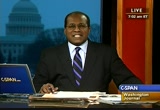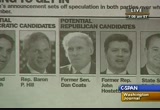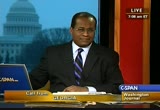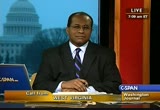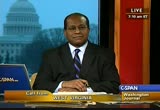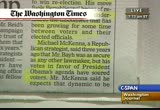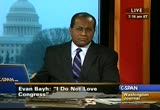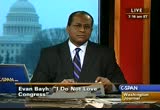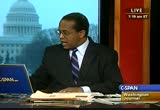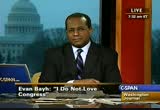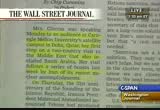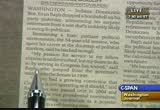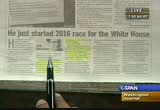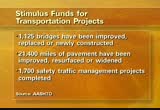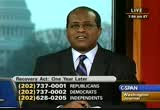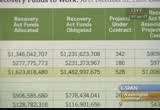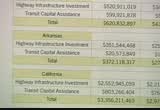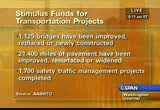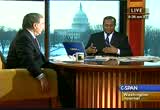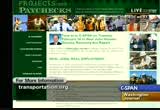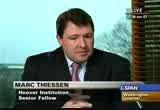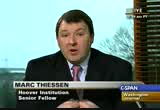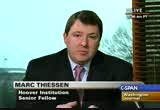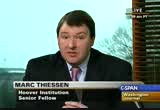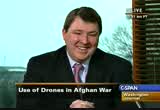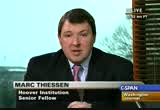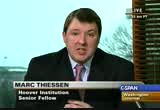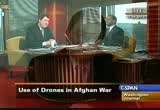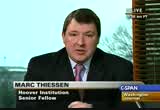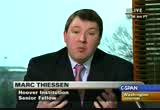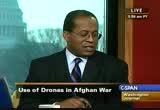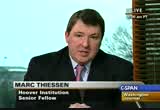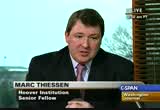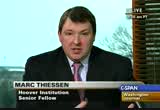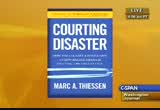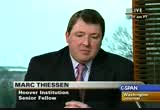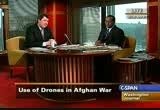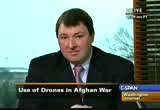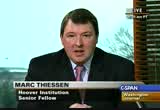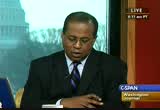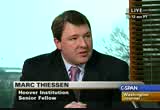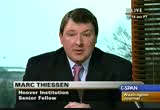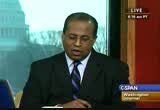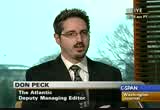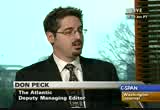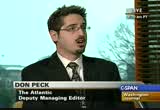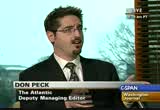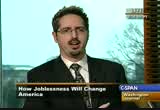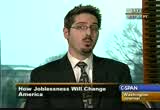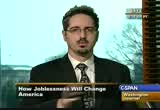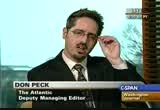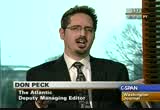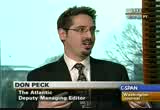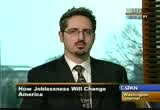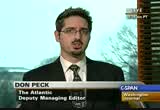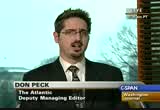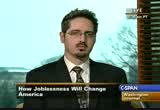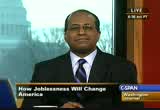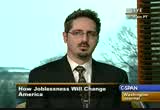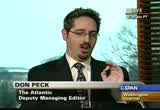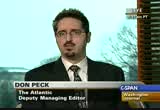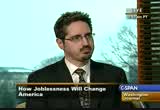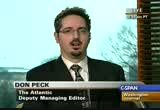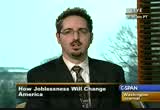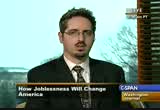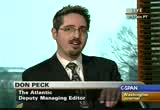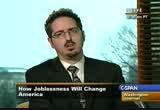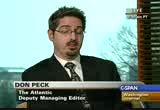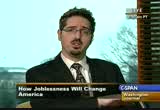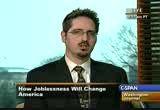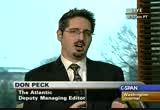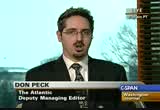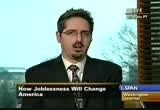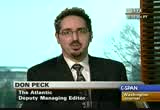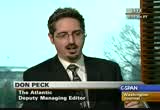tv Washington Journal CSPAN February 16, 2010 7:00am-10:00am EST
7:01 am
as well as the rest of his speech and his future in politics and the future of the democrats in the senate. çko if you want to send an e-mail, the address is journal@c- span.org. if you want to send us a twitter message, it is twitter.com/c- span2wj. the front page of "the new york post." the front page of "the washington times."
7:02 am
çand in this morning's "the philadelphia inquirer." that is what we will be talking about the first 45 minutes. trident online for republicans. -- trenton. caller: i believe he saw the handwriting on the wall. we will kick everybody who is but they're out. host: everybody? caller: everybody. they are all corrupt. host: it was reported he was up almost 20% in the polls. caller: that's right. he might have been but just wait
7:03 am
and see. see how many are left come november. ok? host: henriette, texas, on the line for democrats. caller: i just wanted to comment i don't know if i blame the man for retiring. he shares the majority of the country's view of kind of contempt for congress right now. host: you think he had a contempt for congress? why that? caller: because they can't accomplish of whole lot. they have 40 or 41 people -- they need to have 100% vote to get anything done which is very real impossible so basically they are tied of doing nothing. host: the next call comes from milford, indiana, knacks on the line for republicans. caller: it is so nice to see senator bayh leaving.
7:04 am
he is leaving with all of his campaign war of cash -- hoard of cash. he has been a disaster for indiana, as well as lugar also. we don't have representation. they both belong to the new world order and their plans are moving rapidly under president obama to a one world government. host: knacks, are you still with me? in "the washington times" they have a list of folks who they think may be candidates to replace senator bayh, including rep brad ellsworth, rep hill, former senator dan coats, state senator marlin stutsman, and another is a businessman and
7:05 am
indian tea party organize. any of them you would support in november? caller: i had a chance to talk with three of them but i believe mr. stutsman represents the people rather than the others. as far as danç coates, he went over to the dark side in long time ago. we want -- don't win the battle over it -- office. host: what you mean? caller: he has become a lobbyist for corporations and he moved out of indiana. we surely don't want him back. host: sandusky, michigan, bernice online for democrats. caller: an eye on now? host: yes, denise. what did you think of senator evan by i -- senator bayh yesterday? caller: i listened to his speech all the way through. i felt anyone who felt as
7:06 am
strongly as he did for our country, we need people like that still in our congress to try and change the ones that are not. so i am sorry to hear so many of them leaving. and i hope that more of our good ones would stay. that is my comments. host: thanks for your comment. in politico -- this is talking about a speech at the democratic national convention in 1996. georgette, deirdre on the line for independence. caller: this is deborah.
7:07 am
host: sorry. what did you think about senator bayh's announcement? ñrcaller: i was surprised aboutt but not unhappy about it. i think a lot in congress these days are really feeling the heat, as they should. and i am hoping that the movement is really going to make some changes -- true changes. host: what kind of true changes? what sort of people do you think should be in office? caller: we need to have some patriots who are looking out for the betterment of ourç countrys opposed to how far they can move along in their career. a sincere guy -- i really like him. i watched and quite a bit. w3i think he has other plans, bt can't get anywhere sitting up there on the hill. host: what are their plans are talking about? on the front page of "the new york post" is says evan bayh
7:08 am
quit, but in quotations is says will not run for president, and in parentheses, wink. might he be setting himself up for 2012 or 2016? caller: it would not surprise me. i think the wink is the media talking. i]no way to know what is in his mind. but i really do think he really would make a good president if he decides to run but i thinkç there is a great big shake-up"tp host: charleston, west virginia, on the line for republicans. he says he does not love congress. what do you say? caller: two things that jump out here. there is a trend of career politicians that have done basically nothing with their lives other than be pandering politicians. when you look at their real- world experience, they simply could not hold a job.
7:09 am
this senator from indiana seemed like another pandering politician out there holding himselfxd out to look for a future job as a college president or some business opportunity which i am sure he will retire to. in our state, the mountain state, we have two relics' senators who have done such a disservice by being career politicians. bose -- both of them are out of touch with the voters and both of them will be going with the next election with them. so, i think what we are going to see is a complete turnover in our state as they separately run through the election process and s who areçmçt(?m(ç responsivet least i am calling on our two
7:10 am
senators -- to go ahead and% resign and let the revolution began earlier. host: why don't you think being a politician is a job? caller: 41, it is a job that should be limited -- for one. george washington had it right. in our case, we had our senior senator in congress for over 50 years. you become of this beltway mentality, so detached from reality. 1 billion, a billion -- to translate that, a billion seconds is 31 years and what you hear out of these incumbents and its politicians today is trillions. and listen to the pied piper out
7:11 am
there and they died two months ago was talking health care plan that nobody wanted, majority the americans did not want that. the debt -- the air chicken litter -- chicken little. when you have a real world of business experience or a lot of working in of the real world with a real job, a politician is not -- these folks gavel in at 10:00 or noon time, they work three-day weeks. host: all right, thank you. caller: americans see the problem. host: we will move on to barbara in pittsburgh, pennsylvania. caller: i was listening -- the first time this when i have seen it and i think he touched on a lot of things a lot of people -- i don't know the majority of them, but myself, which i displayed what i did a survey. i felt that whether it was
7:12 am
republicans or democrats, none of them are getting together and the people are tired -- i don't care whether you are democrat or republican or independent -- they are not getting together getting the people's job done. it doesn't matter. all of a sudden fighting for the republicans -- determined to put the president of plaze who is a republican or republican senator, it does not matter because republicans did not do anything when they were in there. what -- if you really look at it, working for the people, that is what we are working for. then when you go to vote someone in there, they have to have money. so you don't get the ordinary guy off the street like you used to to get the job done. and they need to give obama a chance to do what he has to do. he inherited what he has now and they will not recognize it. yes, he has to try to get it together but it takes time to get out of what we were in garet host: what -- what we were in.
7:13 am
7:14 am
going to continue. maybe he will do good things in the future. he is still a young man. i'd think it is hard for a congressman or senator or anybody to, and said the government and think he can make a big difference when there are pressures coming from the outside of this country and people who have a lot of money. i think it is kind of shocking. i am hoping some good things start happening where people can have some power to get into the government's. i love this country, and i can't seem to get assistance. i'm on disability. i cannot seem to get assistance from medicare because they are expanding it and i need an operation or i will be totally blind. a lot of things happening that i can understand what i love the country and i would like to be able to work in this country if we could have jobs and a way of keeping them here and make this country the kate chris riva was before. host: have you voted for evan bayh?
7:15 am
caller: i believe i have in the past. i listened to things people were saying but it is hard to keep up what people are trying to do. because i feel like a lot of people's hands are tied when they go to vote on things. they have to go by the laws that are made. i don't know -- i would not want to be in their position right now -- the news media does not let the people know a whole lot so it is hard to vote when you cannot find things out, you know? host: tape -- thank you for the call. in the on-line edition of "the indianapolis star." the right --
7:16 am
atlanta, georgia, mark on the line for republicans. caller: i voted republican some and democratic solidarity but i really -- democratic some. but i really, truly believe we need an independent party. every time it comes out of their mouth, about the republican party, the democratic party. what about the american people? nobody talks about us. we have suffered. i am 59 years old, i see young people who cannot get a job working at wal-mart 20 hours a week. they have no insurance. a lot going hungry and did not make enough money to feed their house and keep a roof over their head in this country. yet they were able to do something so quick to bail out
7:17 am
wall street but they cannot bailout the human race and their own country. they bring in workers that will work for less money -- money. and the republican party and the democratic party, we ought to throw everything out. you cannot do no worse. we've got the best politicians money can buy and if you do not have enough money like wall street has, you will not be able to get them. host: are you thinking of a third-party? caller: i would vote for dogcatcher as opposed to any politician right now. host: -- caller: i think he is a coward. they did not expect president obama to -- host: are you still with us?
7:18 am
caller: they did not expect president obama to win, they thought it would be hillary. we as black people have always endure the rough of things in life. but they know what that tea party, the republicans and whatever else and the people who really hate for a black man -- i said all the time, i am not going to vote, either, no independent, republican, african democrat. i want -- for in the democrat. host: we will leave it there, kathy.
7:19 am
pensacola, florida, airport on the line for republicans. caller: i would like to ask a question if you would, when people, and they ask do the people's business. i would really like to find out their little bit more about this. because it seems to me when people say that, that they have some sort of selfish agenda for themselves, what can they get out of it. when i see evan bayh retirement, i see it as maybe he is in the riding of the wall, for sure,
7:20 am
but people also say congress has not done nothing. i think they have done a lot of bad things. it is not that they have done nothing. they have joined together to skin the american people out of, i would say liberty, out of their money, out of their choice to do a lot of things. i think these people are really scared. my only fear is that the republican party thinks that this is some of sort of -- what you call it -- i forget the word, but they think it is some sort of approval for what they have done in the past. the republican party, democratic party, they both have been the culpable. there are a few honest people out there. you still have ron paul, and if more people were like them who stuck to the constitution which gives liberty to everybody and does not favor big business, does not favor poor people, does not favor -- it treats everybody equally, that is what you ought to ask people, what do you mean
7:21 am
by the people's business? host: thanks for your call. roanoke, rapids -- roanoke rapids, north carolina. carl. let me ask you this. a headline in "usa today" has bayh's decision raises republicans' hopes for the senate. but the raise your hopes? caller: well, i think a lot of the people watching the political landscape have positive on this and they are republicans and negative if they are a democrat. the thing the american people need to do is realize that they need to look at the political philosophy of both groups. the obama administration seems to be a socialist, to put it bluntly. and the tea party and republicans seem to be standing up for the natural right and moral compass and liberty side of the spectrum.
7:22 am
the voters need to get educated and realize what they are looking at. i do think that the gentleman from west virginia that spoke about the west virginia delegation, i think that is prevalent across the united states except in some democratic pockets. i think people are just very, very disillusioned with this massive deficit that was just inherited by the obama administration from the bush administration but then was compounded by the obama administration because everybody on main street knows that they did not run up their credit cards to try to reduce their debt. i think we are all pretty much in a pickle right now. i just also hate to hear the previous lady bring race into the fact. we are trying to move past that in america. we are americans. unfortunately it will rear its ugly head. but i would like to think that now instead of voting by race we are trying to move the ball forward with ideology.
7:23 am
7:24 am
we will be looking at more stories, and newspapers as we go through the morning. çsouth carolina, don on our lie for democrats. what did you think about evan bayh posset announcement yesterday? caller: good morning, robert. i would tell you some of your listeners are missing the point. i was on with you last month with byron dorgan who was so çfrustrated over the fact he could not get his way importation of drugs the bill by, and he is easily in the senate -- re-importation of drugs bill. that is how the senate is failing as an institution and that the filibuster is being abused, these guys are really socializing with each other, -- are not socializing with any body or cutting deals.
7:25 am
it is not liked -- because of a strategy by the republicans which is, you know, they learned. when they cooperated with clinton we got a lot of things done but not necessarily all their way and they learned from that and they decided, we are not going to cooperate, like what happens under the eight years of clinton because we did not want eight years of obama. that is what i believe. i would tell you this, my final comments would be that you might see some changes now that obama has brought back the guy -- sorry i cannot remember his name -- who was kind of a very influential in the campaign. he is now back in the white house. he wrote a book -- and he is, i believe, going to see a different attitude coming out where they are going to realize republicans are not going to let
7:26 am
them do anything. host: in "the washington times" this morning they got pictures of all the senators who so far have announced they will not be running for reelection. at least six republicans and five democrats, including from florida, kansas, jim bunning moved from kentucky, senator kit bond from missouri, senator gregg from danger, senator voinovich from ohio and then from the democrats, senator chris dodd from connecticut, senator from delaware, senator burris from illinois, senator bayh from indiana and you mentioned senator byron dorgan from north carolina. is there anybody in that group who you would like to see stick around or are you happy to see them all go? caller: no, i would like to see many of them stay. some of them have great experience. they are totally done. they are frustrated -- they don't have the ability. mitch mcconnell is holding the line tight on the republicans.
7:27 am
there are probably a lot of them what to cooperate and get stuff done for the country. there are a lot of good men in that group that you mentioned, both republican and democrat. but i think they just had enough. they just had enough. in the senate needs to rethink the filibuster rule if this is the way it is going to be. for host: we will continue to look at the list of senators. ross on the line for independents. caller: i have come to the conclusion congress as a parasitic organisms -- organism. they have not done a thing for the people since social security was instituted by president roosevelt, and even then he was called a traitor to his class. a the problem is, it does not matter who you vote for, subservient to the capitalist class but they are running the
7:28 am
country. the corporate ceo's and the military industrial power. eisenhower said it. it has come to pass. when people realize -- they need a third party. there is no question about it. host: the uc the tea party as that third party? -- do you see that tea party as the third party? caller: no, they are lily white. i have not seen any blacks in person or any of the crowds on tv. host: jacksonville, florida on the line for republicans. caller: i am sorry to see evan bayh leave the senate. he is one of the senators that does indeed have integrity. and i think both the congress and the senate is totally broken. we as a nation, the united states, not well served by our
7:29 am
washington representatives and i think it would be good if we could get term limits for them so we could really vote them out. like i say, i am extremely frustrated with the process and we are losing many good people because it is just a total stalemate up there. i am almost to the radical opinion that we need to abolish the supreme court, take the constitution and start over again. host: what would you say to the folks who say the elected officials terms are limited by the voters and if they are not doing a good job of the voters will take the modern office? caller: the problem is they are so well funded from lobbyists that new people don't have a prayer chance of getting in. i can give you an example in jacksonville with green and brown and the way they gerrymandered -- i am sorry, excuse me, the way they gerrymander the districts that
7:30 am
she needed 14 counties in the state of florida to get reelected. after the 2010 census, we need to have computers redraw districts that are continuous and not gerrymander so we can keep people in office. and let the voters decide. host: do you live in representative brown's district? caller: i used to, but after redistricting i was into crenshaw's district. host: thank you very much for the call. in "the washington times" in the article on the jump page, but jackson, democratic strategist said mr. bayh was rattled by the port of a torah environment --
7:31 am
decatur, georgia, on our line for democrats. good morning. caller: how or you? -- how are you? i wanted to talk about this guy retiring. a lot of these congressmen are retiring because they are going to come back as independents. they will say they are going home and i the switch over to be independent so they will run. they got the same ideas in the event. but they need to run scared. they haven't been doing a thing.
7:32 am
they are out of touch with people. the republicans sitting up there folding their arms and not working with any democrats. some of the democrats are filled with self important, look at me, i m and important, so they are not doing anything for anybody. in the country is suffering. host: in your opinion, is either side closer to being in touch with the constituency or are they both out of such? caller: i think when they started working on the health care reform and then people started getting all self and pour a, they lost their way. everybody wants to have -- self importance, they lost their way. everyone wants to have at their way. they've got all of these lobbyists spending all this money. the people here running our rail the tv shows talking about they don't -- running around on the
7:33 am
tv shows talking about that one government in social security or health care. my god, social security is government. host: in "the wall street journal" this morning, clinton stepped up criticism of tehran. secretary of state clinton travelling overseas. the right that mrs. clinton was speaking at an audience of carnegie-mellon. this is the way it is reported in "the philadelphia inquirer"
7:34 am
this morning. bluntly warned that iran is sliding into military dictatorship -- joe on our line for independents. what did you think of evan bayh 's statement -- i do not love congress. caller: who does? what a disaster but i wanted to comment on hillary, i think our country is slipping into a military dictatorship. if she wants to be worried about something she ought to be worried about that. about congress doing nothing, one of your earlier callers had it so right. he said it is not that they do
7:35 am
nothing, it is every time they do something it hurts us. they pass trade bills that sends our great industrial might that made america prosperous, overseas. now americans are scrambling around trying to find jobs. they spent trillions and trillions of dollars in debt. we are at a saturation point where we almost cannot afford to pay the interest on the debt. theseç guys are jumping off a sinking ship. they have done nothing but bad things and people want them to go back to work. if i could tell the democrats and republicans -- i know where there are 20 million jobs to put americans back to work. you people left the borders open and brought in 20 million illegals to take the jobs. i don't need picking lettuce -- prefers, construction workers, driving taxis, driving trucks, working in restaurants, working in diners. those are jobs americans canç have. that money would stay here and not go overseas and it would be spending it right here and there
7:36 am
would be paying taxes. i but tell obama where there are 20 million jobs today. will they do it? nope. that is why both parties will be voted out of that is what is going down -- going on. i am not a breath. thank you. host: later in the program we will talk about joblessness with the deputy managing editor @ "the atlanta." he wrote an article about how joblessness will change america. we will be talking about him -- to him about that later on. princeton, new jersey, on the line for republicans. caller: good morning. let comment about one of the earlier callers mentioned the republicans were being cast as the party of no. you know, back after bush won in 2004 it was the democrats that lost everything and he was essentially line up. i am not going to say i agreed with everything would george
7:37 am
bush it economically, but right now this group that is down in washington, but these guys are doing absolutely everything to undermine the economy at everett into under by small business. i'm a small businessman. i have"h2ñ people deployed to one-half years ago. right now i have four people employed. i and elizabeth, new jersey, a minority community and previously i was in newark, and a kentucky these guys want to work and there is not a dam thing going on in washington, d.c., to about the inner city, to help the blacks, to help the hispanics, get new jobs. d.c. is totally disconnected from what small business america can do to help the rest of the country. the big companies are not going to create good jobs. they are downsizing, cutting costs. they are making sure their value is greater. the policies are just out of
7:38 am
control. host: what kind of business do you have? caller: transportation warehousing. host: right after this segment we will be talking about the stimulus package and how the recovery -- or the recovery act, rather, one year later. our guest, john horsley, will discuss the anniversary of the reed -- recovery and reinvestment act, is positively highway and transportation projects and you want to tune into that. thank you for your call. next up, stephen in washington, d.c. caller: to whether letting me on the air. i want to make one -- thank you for letting me on the air. did i hear something in the news about evan bayh having a conflict of interest with health insurance companies? his wife works for one? host of i will have to take your word --
7:39 am
host: i have to take your word for it. what does that mean with his statement about not letting in congress? caller: 1 of obama's made initiatives is health care reform -- another band -- abandoning the ship. we got very close to getting some kind of significant reform and then we have another so- called democrat who is jumping ship. probably because the conflict of interest with his wife working for the insurance companies and he is selling out. but let me sayç this since i wl not be the to comment on the upcoming talking about jobs -- by the way, you have done an excellent job with your discussions to on the job and economy as i recall from some of your shows. the expansion of health care services is an opportunity to employ hundreds of thousands of
7:40 am
americans. host: thank you for your call, stephen, going a little bit off the rails. but regarding your point about the relationship with senator bayh and president obama -- they write about it in "the new york daily news." back to the phones. hot springs village, arkansas. henry all for independent -- henry, on the line for independents. caller: it starts with how people are elected. it used to be it cost millions of dollars to run for an office.
7:41 am
today it is going to be a billion dollars to run for office. what in the world -- why do we have to pay that much money or they have to raise so much money to run for an office? that is stupid. stupid. but the thing is, the people retiring from congress, smart people have integrity, but you know who is leaving? the good peopleç are leaving ad the corrupted once who do not even pay income-tax says stay in the. host: thanks for your call. "the globe and mail close " says mitt romney threatened on a flight out of vancouver.
7:42 am
westminster, maryland, stopped on the line for republicans. caller: i have to wonder why man like evan bayh says he does not love congress. for one year his party had a filibuster-proof majority and the republicans could not stop anything in the senate. the democrats controlled everything, and they still do. why does this man not love congress? he has not been there long enough. only 12 years, i think. and all the perks and pay and benefits provided to the united states senator, this man is set for life. so one must ask, why does not
7:43 am
love congress. it -- is theç administration blocking his bills, is harry reid blocking the bills, those who want to go home to indiana and run their? what hasn't -- one has to ask why does a man with a state senate seat in a senate controlled by his party not of congress? host: joshed green -- josh greenman writes --
7:44 am
next up is gene from a long island. caller: evan bayh, what he did is he dropped out of the senate because he wanted to show a point they are not working together and they are doing everything so barack obama will will not get anything done because they don't want aç blak man doing good in that office and that is why there is of much commotion going on. nobody wants to say it. that is the reason why did they don't want to see a black man did good do -- do good. host: jimmie on the line for independentst( men's top beach. caller: just south of the international speech but where the race track is -- just south
7:45 am
of the international speedway with the race track is. what america needs to do is we got what is going on. this is a war by a group of very wealthy individuals who have been running everything in the world for years. çwhat they are doing is using their money to bankrupt. they want america and our government to be bankrupt so the public no longer has any ability to run anything. that is why they keep making it more and more expensive to run for office. and if you are not in a little political clout to get the money you are not going to get into office. that is what is killing america. we would be better off putting names on a wheel out of the phone book and spin it and say for two years or four years, you get to vote for the best interest of america and after that he retire and you can't work for anybody that you have taken money from or anything. host: if your name comes up, are
7:46 am
you ready to serve? caller: well, yes, i tell you what -- i would. as long as i could be honest about it. i am not a perfect person. nobody is. but we all love our grandchildren, we all love our children and we want to see america do better and it is hate and speech we hear out of the news service -- who pays for all of the news? host: will leave it there. in "the new york times" this morning, excise tax loses support. front royal, virginia, on the line for republicans. caller: i love the idea of a man just put forth about it just
7:47 am
spinning all the things. -- spending the us saying. as far as congress is concerned -- i am a strong republican but i get so many requests for money for the republicans that i have put off -- put down all of these requests for money -- a picture of them, and i am sending them to all republicans because they are asking for it so much money. on the other side of the ledger, from bayh's standpoint. if i had to work with people like a pelosi and harry reid, how in the world can a mild- mannered man deal with somebody as morally and physically corrupt as pelosi. she is a millionaire -- a billionaire. i don't know, maybe i don't
7:48 am
understand all of these zeros. but she's got an awful lot of money and she is so terrible. i love borscht -- bush, brace yourself, democrats. i thought he was well intentioned and he was loyal to the republicans in congress. it was the republicans in congress who were not doing the right thing. he supported them because he, too, is a loyal republican. host: we will have to leave it there. thank you very much for your call. project and paychecks, a one- year report on state transportation successes under the american recovery and reinvestment act, is a report that has just been published by the american association of state highway and transportation officials. there executive director, john
7:49 am
horsley, will be in a few seconds to explain some of the facts and figures in this report. we will be right back. [captioning performed by national captioning institute] [captions copyright national cable satellite corp. 2010] >> pennsylvania representative john murtha died last week at the age of 77. his funeral service is this morning in johnstown, and pennsylvania. the 19-term congressman with the birthday of numbat elected to the house and he will be eulogized by the commandant of the marine corps general james conway and also by house speaker it's a pelosi and by his daughter. we will have live coverage beginning at 10:30 a.m. eastern here on c-span. >> would your wildest imagination did you were writing
7:50 am
fiction you could not have made the story up -- with your wildest imagination. >> he is interviewed by the special counsel and from president clinton on "afterwards." >> your one-stop shop for everything c-span c-span.org /store. dvd is on the capital, supreme court, the white house. our series on presidential libraries and nearly every c- span program plus books, wolpert, coffee mugs, and other accessories. look for these and other getting ideas at c-span.org/store. >> "washington journal" continues. host: john horsley is executive director of american association of state highway and transportation officials and he is here to talk about his recently released report, the one-year report on state transportation successes under
7:51 am
the american recovery and reinvestment act. welcome to the program. guest: good to be here. host: welcome to projects qualify for the money? guest: they have to be projects ready to go. you heard the expression shovel ready? these were highway projects, transit projects ready to go 120 days after the bill passed. host: among these shovel ready projects, your numbers show that once thousand 125 bridges have been improved, put 1,400 miles of pavement have been improved, -- 21,040 miles of pavement, 600 miles of bike lanes and 7004 into the but the buses have been purchased. how many are new versus those already under way and just needed more money to keep going or to get reinvigorated? guest: most of these projects
7:52 am
were projects on the shelf that had been designed or planned but just did not have the funding to proceed. when the federal stimulus dollars became available it made it possible for states, cities, counties, transit authorities to move forward with projects that were otherwise ready to go host: how many are still up and running and how many are completed? guest: about 2500 have been completed. that means we have about 15,000 that are either under way or to be underway later this year when the snow goes away and in the ice thaws. for about half the country, the construction season does not happen till about april. ihost: any of that set aside for snow removal in areas like washington, d.c. have a guest: in just come down route 50 to get the studio, we wish there were some and some to
7:53 am
go into pothole fixes but right now these are preprogrammed for projects that have been approved by the federal government to proceed. host: how would you compare these two wpa projects popular during the fdr had been a station? caller: we think these -- guest: thinke3v these provide double payouts. the gift that keeps on giving. the immediate impact is to give thousands of people jobs. but long-term payout is improvements to the highway system, safety improvements to bridges, improvements to the 10, 20, 30, 50 years into the future. host: we are talking about the recovery act one year later as specifically as it applies to highway and transportation projects with john horsley of the american association of state highway and transportation if you want to get involved --
7:54 am
if you have gone to work or were put to work because of one of these recover at projects, definitely give us a call and let us know what it is you are doing out there. or first call comes from sarasota, florida, michael maligned for republicans. caller: appreciate your speakers presence. i have a question -- not trying to be disrespectful but i'm curious about these employment figures. ;r know i drive by and road construction projects in florida nearly every day, and i notice there are 50 or 20 guys standing
7:55 am
around, most of them waving flags and directing traffic. but for the number of miles under construction i don't see very many people out there actually on the job. i see people in tractors, and most of those seen to be contractors and already have jobs. i am wondering, when we look at the employment figures, are these new jobs? are these people unemployed and are getting jobs or are these replaced jobs? because it is a lot ofç money d it does have a significant impact on our economy. and jobs are needed so badly. is this really creating more jobs? guest: an excellent question. thank you for calling in. the documentation that has been done -- every state, the metropolitan planning organizations and transit authorities, have to report
7:56 am
every month to the house transportation committee and house of representatives and they came up with a report at the end of the year that showed there were 280,000 direct on project jobs and those are either project job saved or created. in some cases, it could've been a person who was going to lose their jobs unless the project went forward and the other cases people out of work were hired to work on the project. but those weren't direct jobs, directly attributed to the stimulus projects -- those were direct jobs. and those together would direct jobs came to 890,000. across theç country, thousands and thousands of people have either been put to work or were able to keep their jobs as a result of the stimulus funding. i note that florida received around $1.3 billion in highway
7:57 am
dollars and another $277 million in transit dollars. so i would be willing to bet it made a major difference in what florida dot and the cities and counties in florida were able to build the last year. host: you make reference to the numbers in a chart that is in the report. right next to the recovery funds allocated, $1.3 billion, recovery act funds are obligated, $1.2 billion. it is that the amount of money already spent or that has already been designated to a particular project in florida? guest: when it says obligated, that means it is ready to move to contract. these are federal dollars, and we have to qualify the projects before we can spend them. when it saysç obligated, that means they have gone through all of the federal paperwork, they have been given the green light by the federal government and then we can go to contract with
7:58 am
contractors and actually spend the money to pave a road, improve a bridge or buy a new bus. host: the next call for john horsley comes from alex from jacksonville, florida. caller: good morning, john. my question is, i wanted to know, are there any regulations as far as the infrastructure of how these contracts are going to be dispersed among different construction companies to make it a fair range oft( different companies and workers that have these bids and can bid on the contracts? are there anyw3w3 regulations sn how it has to be doneç, or do t how it has been done? guest: in florida under state
7:59 am
law and also under federal regulation, there are all sorts of rules that govern how to bid on these projects. the process the state goes through once they received the green light from the federal government is to advertise the project. contractors then submit sealed bids quoted best price they offered to do the work for. the contractors have to meet all of the terms and conditions of the state's build into the set of bid specifications. and then once they open the sealed bids, the states determine which of these of metals present the best cost or the best project overall proposal. çand then the contract is awarded. so there is a thorough review all called the federal and state legal requirements before the contract has led to a contractor. and it is open competitive. and the good newsç is we are
8:00 am
receiving consistent bids 10%, to 30% below the engineer is estimates. we are getting a great deal for the taxpayer. it should not be do you know, but who has submitted the best, most competitive lowest price bid. host: our next call comes from franklin, arkansas, randy on the line forç independents. in arkansas they got $351 million in allocated highway infrastructure investments and $20 million and change in transit capital assistance. the go-ahead. caller: i have a question. i was in dallas last november for about a month and during the time i was there, one of the local national networks brought in a story about the trinity river bridge project that they were building their in dallas, a new bridge they were building. the story was they said if you
8:01 am
8:02 am
then texas dot, or the city of dallas would issue a bit on the contract, any contractor that is qualified with to mid a bid. then the city would make the decision. it is not our experience that a foreign contractor would even be eligible to propose. i cannot imagine a contractor finding a cost-effective of burning in the italian workers from out of state. however, this would not be even alone along under federal procedures, as i am aware. host: the president and the
8:03 am
organization of your printer director of organization rights in the report -- how much more would you like to see in a second stimulus bill? is there a chance of getting that passed through congress? guest: i am glad you brought that up. i am sure butch brown is watching the program. we are definitely interested in a second round, job creation, legislation. in december, the house passed the bill that would provide another $27.5 billion, another
8:04 am
$8.5 billion for transit. in december, they put up this report, calling for a hundred projects valued at $79 billion that we have documented, that harsh -- ready, if -- that are shovel-ready, if the congress approves it. majority leader reid came out with a broader recommendation last week, and we expect it to affect transportation shortly. if congress has dollars that they think they want to commit to transportation, we can do a great job of delivering also, we only received 6% of the overall
8:05 am
economic stimulus legislation, but the highway and transit projects have created over 25% of the jobs so far. if congress wants to create come to pass, transportation is the answer. host: if congress to keep on putting money into programs like this, how much incentive is there from the private sector and public to contribute money and cut off the money coming from washington? when will state money be able to stand up on their own 2 feet and pay for the projects that need to be taken care of -- two feet and pay for the projects that need to be taken care of? >> 35 states have had to cut back on spending. 25 state, because of the reduction of tax revenue, will
8:06 am
be cutting down on transportation projects. once the economy picks up and revenue returned to the state coffers, states will spend about 75% of the money spent on roads. state and counties to pay the lion's share of in already, but right now we could not survive with the economic stimulus dollars to help us in the downturn. host: john horsley is our guest, of the american association of state highway and transportation officials. scott in springfield, virginia. caller: i happen to sit on the 50-yard line of utilities in washington. it is a good program and it has been great for the country and has been putting people to work.
8:07 am
people cannot really invalidate where illegal aliens come from, and yes, it happens, but i think the federal government needs to watch it a little closer. i have been there on payday, and i see people going to western union, acquiring money south of the border. -- wiring money south of the border. guest: i am under the impression that state government has to pressure win every state contractors present their payroll for review, that they have checked the immigration status of the employees they have, social security, and other documentation, or they cannot be paid. the federal government has obligations they place on
8:08 am
state, and states on contractors, for the people they employ. hal rigorously that is enforced, we have to see. you make a good point, i think it is under control, but it is something that states have to follow up on. host: how much of this money is going to projects like high- speed rail? guest: two weeks ago, i had the honor of joining president obama, vice-president biden, in tampa, florida when they announced who would get the first round of economic stimulus dollars dedicated to high-speed rail. tampa and orlando about $1.2 billion. california also got some. they were the two big winners. over all, there were 37 states that wanted to compete. ultimately, 31 states received
8:09 am
grants under that program. the exciting thing about the tampa to orlando project, and los angeles to san francisco, -- it will be true high-speed rail. 220 mile per hour service is being planned. in florida, they have the right of way already acquired on the interstate going between tampa and orlando, and they plan to provide service down to miami as well. president obama believes this could open up a new era of trouble in america, similar to what you see in japan -- travel in america, similar to what you see in japan, europe.
8:10 am
this $8 million will be accompanied by $12 billion in additional dollars. we think we are off and running. host: how soon before they begin construction on this project? guest: there are several projects that will improve and upgrade the speed on already existing service, so those projects will take place this summer, this year. the florida and california projects are longer-term. it will take several years before service is launched on that true high-speed rail. faster service on existing tracks, those could be completed before the year is out. host: will it be a private enterprise running those rails, will it be a waquasi-government
8:11 am
organization like an term? guest: we are almost sure amtrak would be a major player. florida is giving consideration to having an open competition that could bring up a contractor other than amtrak. host: springfield, maryland. delano on our line for democrats. caller: my question about this high speed rail system, going from los angeles to las vegas, is that still on track? guest: i am not certain if that project received funding. i know there were several grants
8:12 am
given to california, a smaller one given to nevada. i will have to see if that was in the next or not. what i did want everyone to be aware of -- we have a website, recovery.transportation.org, and it contains more material than what is in this hard copy. that is our website for those who would like to see specifically what is being done in your state. recovery.transportation.org. host: next phone call comes from georgia. ivy on the line for
8:13 am
independents. caller: thank you. you do a great job. i think you would be fun to hang out with. i have three points, if you do not mind. callerhost: just because i themo hang out with. caller: my father was a contractor a while ago. people would put in bids low, and then they would have to come in with secondary funding. in essence, it is in made up job, they made up number. whatever in a bid will not be the true cost paid by taxpayers. i wonder if that was being tracked in your work?
8:14 am
second, i know that state governments for seed money for all lot of bridge work, prior to the collapse of the bridge collapse in minneapolis. it turned out, governors were taking that money from the bridge missionary -- discretionary fund, and putting it back into the state budget. the third thing -- the fact that you are doing something about infrastructure is awesome. infrastructure jobs stay in the country. if you could make sure we have the americans doing the job, people registered to work here, that would be great. it does seem to political reality is, they love to see new things, new bridges, new roads. but right now in this
8:15 am
environment, rebuilding bridges is a critical infrastructure needed in our country. if all we did was bid on bridge replacement, and mandate that a certain amount of steel had to come from this country, then you would be able to not only revitalize the construction industry, but you could also affect some of the jobs in the steel industry. guest: those are all three could questions. the first one, the fixed bids that contractors submit are binding, the answer is yes. contractors are given excellent bids, about 10% to 30% below the engineer estimates. those fixed bid to, contractors
8:16 am
to submit them are accountable for the amount that they quote. to the second question of whether or not states were receiving bridge fund and diverting them to other purposes, we examine that after the minneapolis collapse. we found 2004 was the last year that we have complete data. in that year, they received $4.7 billion in bridge funds, but net-net, they ended up spending about $10.2 billion, so they are spending more. year after year, states are putting a great deal of our overall spending into bridge repair. the third question, should there not be a buy-america provision, and shouldn't more money be spent on rebuilding facilities?
8:17 am
both of those are in the bill. over 90% of recovery dollars are going into bridge and highway repair/replacement. and there is a buy america provision that requires us to purchase american steel. we believe the program is responsive to the legitimate concerns that you have brought up. host: according to the figures you provided, 1125 bridges have been renewed or reconstructed. shreveport, louisiana. ben on the line for republicans. caller: we have to get rid of some of the red tape. my second point is, and that man
8:18 am
who called from georgia makes too much sense. we do not have any more money in america for another stimulus. 80% of the people are with me on this. we cannot be hiring illegal aliens to do american jobs. obama, in his own words, to the hispanic caucus -- this is their way to citizenship, through high wage jobs. this is going to be the democratic party that does this to america, and this offsets the hell out of me. god bless you, you have not hung up. host: it sounds like you have had experience with red tape. caller: yes, i have built bridges before. i have done tons of work.
8:19 am
i have done more construction work that you can imagine. i poured the concrete at the gm plant in shreveport, louisiana. that person from georgia hit it on the mark. there are more jobs that can be done. get rid of some of the red tape. we have to have the americans go back to work, not illegal aliens. there is a process to come to america, and that america is on my side on this. host: in louisiana, highway infrastructure investment, just over $4 million came to your state. were you able to get any of that money? caller: i am not going to lie to you, i do not know.
8:20 am
interstate 49, i do not know where we are. i cannot answer that question. what americans do not know about bobby jindal, he is no governor. conservatives down here do not like him. the news media does, they love bobby jindal. guest: there is nothing we could agree on more than this need to get rid of red tape, cut it back. the good news is, the highway administrator who used to be the president of the national association of state highway and transportation officials -- he was the director in arizona before. he has made the commitment to cut in half the time it takes to authorize federal highway projects. we have a team working with his to work on cutting back federal red tape. but there is no question, we can
8:21 am
do better in that regard. with regard to whether or not we need another round of stimulus investment, we believe two things. the unemployment rate in the construction world where you are from is about 22% naturally -- nationally. we believe that is too high. the house and senate are working on a bill that may well provide somewhere in the range of $30 billion. if there is any area that can put that money to work fast and effectively, it is transportation. i think we saw that last year. host: john horsley served as the deputy secretary of the department of transportation from 1993 to 1999. he is also the chairman of
8:22 am
rebuild america coalition. he was also a peace corps volunteer. where did you serve? guest: i was in the mountains of peru. when i was younger and slimmer, i played soccer with the local soccer teams. i was building schools and water systems. i will tell you, the peruvians that i worked with, they work hard. host: one year later, with regard to transportation in recovery projects. next phone call on the democrat line. caller: i want to start with an observation and then ask a question. i find it interesting, on the previous topic, everyone was talking about socialism this, socialism that.
8:23 am
this is government programs, government spending. almost speaking of in as if it was an evil institution. now we have the actual implementing of the drums, and everyone seems to be more concerned now about who gets a piece of the pine. to me, it seems hypocritical. we were just talking about how this government, in their words, take over, of these institutions is an unjust. now we are talking about how these jobs are being doled out. getting to my question, it is a topic that has not yet been touched upon, but it is something that the current administration has made great
8:24 am
strides on. that is the dependency on foreign oil. i look at the high speed rail system in europe, the efficiency of britain's transit system, and i wonder, how do you think all this government spending is doing creating projects and improving the transit system? how is that going to help our dependency on foreign oil? guest: that is a good question. the position of the 50 states is we ought to double transit rider ship in this country -- write ridership in this country. we believe this will reduce the dependence on foreign oil. another trend that we support is
8:25 am
the shift to vehicles that are no longer powered by gas and diesel, but powered by electricity. 20% of the vehicles in the market 10 years from now will be powered by electricity. we think that is a positive sign, and something that will reduce our dependence on foreign oil. but no question, that means we need to produce more electricity through renewable resources, whether it is through nuclear power, solar, or wind power. we see a major change coming in, petroleum we use and how much we produce internally. we also see people promoting natural gas. there are many taxi and bus fleets that have converted to compressed natural gas. we think that is another good
8:26 am
alternative to foreign oil. host: there was an article in the sunday section of the "washington post" talking about the revenue from gas taxes shrinking. basically, the premise of the article it is saying as we get more fuel efficient cars, the income from the gas tax will come down, and instead of taxing the gas that we use, the government should be taxing miles traveled by car in order to pay for some of these projects. guest: we think they have the problem right, but maybe the timing is off. these studies have been done on this. there were two congressional
8:27 am
commissions that have studied this issue, and both said, in 15 years, we need to make the transaction -- transition from a gas tax to a vehicle-mile travel tax. also, there was a research study and on about 2006 that had the same thing. the question is, as you go to this new form of taxation, which is based on how much you trouble, how do you adjust for the size -- travel, how did you adjust for the size of the vehicle? that is one policy issue that congress will have to figure i'lout. no question, as a vehicle to get more efficient, we will have to come up with an alternative. host: next phone call from ohio.
8:28 am
john on the republican line. caller: how are you today? with the department of transportation, about these high speed rail -- i live in cleveland, ohio, and i have business in florida. people do not realize everything they eat comes from semi trucks. i employ over 700 people. we have not asked -- both of these companies are falling down on the roadside because of the rates. there is no way a trailer can go from florida to texas for $1 a mile, when it cost you $1.20 to run.
8:29 am
the department of transportation, when there are trying to add up their leverage for a $2 a month left, and they give you a ticket for a month left that costs you $365, is ridiculous. people just do not realize. right now, all of these high- speed rail, it is not going to deliver groceries to stores. trucking companies, on average, right now are having 2500 trucks turned in by these companies. i have approximately 2000 trucks. host: i do not mean to cut you off, but do you have a question?
8:30 am
caller: everyone is talking about dot. maybe we should cut back on these scale houses and maybe put more money back into trucking. that is what feed everyone in the country. guest: excellent question. most people are not aware that 93% trade by value moves by truck. we work closely with the american trucking association to get the highway system up to a good state of repairs so that trucks can run safely. the enforcement that is necessary, sometimes, that does involve fines, and we are sorry about that, but we have seen a trend line to better compliance
8:31 am
and safer trucks. no question, the tough times that the trucking industry is facing right now -- we have heard a 20% falloff in the loans that you are carrying, but as the economy comes back, we want to make sure the infrastructure is safe for you to continue to move america's freights. host: if you want to read more about their project, go to their website, recovery.transportation.org. when we come back, we are speaking to marc thiessen. he will be here to talk about the use of drones in afghanistan. first, at a news update.
8:32 am
>> president obama meet with advisers at the white house, and then goes to a job training center in maryland. you will be talking about creating energy jobs. later today the president will be meeting with the dalai lama. meanwhile, china has urged the u.s. to cancel the meeting on thursday, saying it may damage relations between the two countries. senator john kerry speaking earlier on cbs says the capture of the taliban's top military commander is proof of a stronger cooperative effort between the u.s. and pakistan. adding that the pakistan government now knows this is their flight. he is in islamabad for a meeting with pakistan's president. meanwhile in saudi arabia, hillary clinton tells college students if iran gets a nuclear
8:33 am
weapon, it could trigger a nuclear arms race in the middle east, which could create problems which would be "quite dangerous." those are some of the latest headlines. >> pennsylvania representative john murtha died last week at the age of 77. his funeral service is this morning. the 19-term congressman was the first the vietnam vet to join the house. we will have live cartridge beginning at 10:30 eastern. >> with your wildest imagination, if you were writing fiction, you could not have made this up. >> ken cormley a afterwords"
8:34 am
this weekend. host: mark thiessen is here to talk about the use of the drones in afghanistan. first, i want your impression on the story. a top commander in the taliban is captured. he is the highest ranking taliban figure to be cut since the 2001 invasion of afghanistan. how important is this to the u.s.'s overall mission in afghanistan? guest: it is very important, and a very different approach to the strategy. he is potentially a treasure trove iof the information.
8:35 am
let's just hope we do not read him his miranda rights. but this is also part of the criticism coming from those from the republican party. they are criticizing our ability to interrogate leaders. our goal is to change of policy. host: with regard to interrogations, who should be taking the lead? u.s. military, intelligence, or afghan security? guest: this meter is being held, not by the united states, but by the pakistani intelligence services, and is being questioned by them. when president obama issued his executive order, he said, effective immediately, any one in custody of the u. s., owned by the department of the united states shall not be subject to
8:36 am
any interrogation techniques or approach, or treatment that is not listed in the army field manual. if you see the big loophole, the pakistani prison, where he is being held, is not a facility owned or operated by the united states, and is not being interrogated by an officer under the control of the united states. so barack obama has a policy and of moral preening when it comes to interrogation. pakistan, i suspect, has not requested a copy of the army field manual. let me read you a statement from the human rights report. the reports aren't that security forces and intelligence forces torture individuals, occasionally resulting in death or serious injury.
8:37 am
on one hand, he is taking the moral high ground, but he is also outsourcing the interrogations to the pakistanis. host: let us talk about the use of drones in the afghan war? . why does the obama administration depends so heavily on them? guest: they are very useful. they can hover over areas without being in danger. they can be deployed quickly when there is a time-sensitive situation. they are very important tools in the war on terror. host: your article, dead terrorists tell no tales, in your opinion, is the use of these drones going too far?
8:38 am
guest: it is not the use, but they are being used as for interrogation and capture. a dead terrorists cannot tell you about a future attack. there was a story that said u.s. pursues of canada. it tells the story of the leader of al qaeda in east africa from september of last year. the military wanted to take him in for questioning. they went to the white house and asked, should we kill him or take him alive? they order to kill him. he was the top leaders in east africa. he could have told us their plans. the white house chose to kill him instead of capturing him. a senior military leader was quoted to the reason as to why, and he said we do not have a detention policy to hold high
8:39 am
value terrorists. so we do not have the ability to detain and effectively in terror get top terrorist leaders who can tell us their plans for -- interrogate top terrorist leaders who can tell us their plans for the future. sometimes you do have to kill them. a dead terrorist is better than one who is at large. at the same time, you cannot get intelligence other than through the delicate -- interrogation to see what future attacks can be. i interviewed general michael hayden. one of the things he explained was, intelligence is like putting together a puzzle. you have thousands of pieces on the table, but you cannot look at the picture on the box.
8:40 am
to fit the pieces together, you have to interrogate the senior leaders who know what the picture on the cover of the box looks like. and when you capture khalid sheikh mohammed, or one of the people that the bush administration interrogate, they are not only giving you intelligence, but they are telling you how the intelligence you have fits together. that is how we can stop terrorism. host: we are speaking to marc thiessen of the hoover institution. we are talking about how interrogations kept us safe, as well as the use of the drones in afghanistan. republicans, 202-737-0001. democrats, 202-737-0002. independents, 202-628-0205.
8:41 am
our first call comes from charles. orange, connecticut. caller: good morning. hopefully everyone is having a good morning. mr. hoover man, that is in reference for who you work for. all want to keep this short and simple. when is this going to stop? here we are using the same military, the same tools, okay, everything, in a war that has been going on for about 10 years. nothing has changed. the man who your support did not do his job. had we done this job, we would
8:42 am
not be having this conversation. when you step up to the plate in a baseball game and you do not hit, it is up to the manager to put you on the bench. when you fight, instead of assisting the administration, you are helping the enemy. guest: criticizing the administration's policy because you think it is putting the country at risk is assisting the enemy? caller: no, let me finish. this is the problem, the infighting in the country. the other day, susan had a congressperson on. host: that is ancient history. i need a question. caller: this is the united states of america. have you been in the military?
8:43 am
guest: no, what does that have to do with anything? host: we are going to move on. caller: thank you for taking my call. thank you for coming in to give us a bit of insight. my question is, are these things accurate, is the military making sure that these things are not killing civilians? how accurate are they, what is the likelihood of them breaking down? guest: they are very accurate, but the fact is, sometimes civilians are killed. a few months ago, it reported drone attack was used to kill a senior taliban leader. he was found and killed, and in his house, visiting was his
8:44 am
father-in-law. family members were apparently killed and injured. the administration had said that we violated american values in the war on terror by interrogating terrorists. this is an example of hypocrisy from the obama administration. we do not have to make a choice between this and our ideals. but the president is signing a death warrant when he signs off on to these things. arguably, it is not a morally superior choice. if you kill women and children along with the terrorists, why would you do that instead of capturing him and interrogating him? the president is open to the charge of hypocrisy and he is only -- and he is making not only morally-tricky dick
8:45 am
choice strategic choice. there is a military and the end intelligence component to this. host: next up is a springfield, ohio. the line for republicans. caller: good morning. i wanted to tell your guest, i love bush. i wish he was back. my question is, [inaudible] guest: i think what she is saying is these terrorists need to be held as enemy combatant, not as common criminals. i could not agree with you more.
8:46 am
the problem is, the cia had a program to interrogate these leaders. in the bush administration, we interrogated over 100 terrorist leaders. questioning produced unbelievable amounts of information. according to the cia, half of what we knew itabout al qaeda came from interrogations. when khalid sheikh mohammed was captured, unbeknownst to us, they were planning an attack in karachi. they were planning to blow up our marine camp in the movie using a water tanker filled with explosives. they were on their way to recruit terrorists to fly airplanes into heathrow airport and downtown london. khalid sheikh mohammed have
8:47 am
actually developed a cell in southeast asia that would fly an airplane into the library tower building in los angeles. we located these 14 men who were waiting in pakistan, awaiting orders. we saved a lot of lines from this program and barack obama has put us at risk by getting rid of it. host: cambridge, illinois. eric, on the line for democrats. caller: you have criticized the administration's use of predator drone, but we all know the bush administration used them as well. the previous administration's use of torture was criticized not only for its morality for international standards, but also for the questionable effectiveness of what we
8:48 am
received. curveball was one of the reason we used for invading iraq. i think this bait and switch to try to suggest that there is hypocrisy, when the fundamental quality of intelligence from torture is unreliable, that is one of the fundamental reasons we do not use it today. guest: 1, we did not torture anybody. in fact, pakistan does, according to the human rights support, and barack obama is outsourcing hour interrogation to them. so the hypocrisy charge stands. s to the effect this, you are wrong. -- best to the effectiveness, you are wrong. that was in question until the
8:49 am
obama administration looked at all the documents and found unequivocably that this program was successful. obama had accused us of torture, said that the program did not work, and it is absolutely false. that is what my book is about. before waterboarding, clique check muhammed was defined. -- khalid sheikh mohammed was defiant. he would say, soon enough, you will know. after waterboarding, he became the most prolific detainee in u.s. custody. he ran glasses on al qaeda where he grew schematics on how they operated, with their command structure was, how ya usama bin laden communicated, how they chose targets. this was invaluable information that we knew almost nothing about when we were hit on 9/11. we could not have gotten that information without the enhanced
8:50 am
interrogation program, and now we have lost that ability. host: tell us about the process that takes place once the drones are in the air, and the bad guys have been spotted. what is the decision to send troops in to get the bad guy, or just to send a missile in? guest: those details are classified, so you cannot talk about it. however, in the bush administration, we did use predator drone. some areas, you cannot get troops in. you might have time-sensitive intelligence. there is no way to mount an operation, but you could kill someone. the fact is, barack obama has dramatically increased the use of these predators while reducing our capability of capturing and bringing these
8:51 am
guys into custody. clearly, there has been a decision made in the administration to kill, rather than capture senior terrorist leaders. host: tell us how they are being used in the offense in [inaudible] guest: i would assume they are, but i cannot comment on it specifically. host: next phone call. caller: i want to start by saying i do not think much of you. i would not give you 15 cents. guest: at least you should understand what you're arguing. caller: i would like you to finish your state -- my statement before you open up your mouth. host: let's keep it simple. caller: where is your field of expertise? what is the hoover administration -- institute?
8:52 am
i would like to know what your expertise is and how you are getting all of this on classified information that no one knows about. guest: i spent 15 years in the national security field, i spent three years as the chief speech writer for secretary donald rumsfeld. i was a member of the white house senior staff at the end, chief speechwriter to president bush. as a speechwriter, i was asked on september 2006 to draft his speech revealing the existence of this interrogation program. for that speech, i was put into a secure room at the national security council and was given access to all the intelligence that this program produced. quite frankly, i was given access to the actual interrogators. the people who water boarded
8:53 am
khalid sheikh mohammed. they walked me through all the information. i start my book with the sentence "you should not be reading this book, and i should not have been able to write it." some of this information was some of the most classified in the possession of the u.s. government. the reason i could write it is because barack obama released to the information. in the past year, he has released tons of information, according to leon panetta even, that gives the terrorists a guidebook on how to withhold information. it is very damaging, but it frees someone like me, had access to the intelligence. in my book, you can hear from the interrogators, in their own words, how they stop attacks, how they apply their technique, and why it works. host: you are now a weekly
8:54 am
columnist for the "washington post." for those of you who want to continue to beat him, you can find him there. baltimore, maryland. caller: good morning. the more your guest tries to explain himself, i think both sides are hypocritical. i am more levelheaded. i think the folks in the field know what they are doing. you are not military. if they had not bond as terrorist, you would say that they left them alive. i am sure if they could capture every one of them, they would. everyone wants to keep america safe. i do not think keeping america safe is only one party's idea. i trust military generals.
8:55 am
if they think this is the best way forward, then that is it. the last few years of the bush administration, they were humiliated. i do not think touting them as your guys is because we the way to go either. guest: fair enough. i agree with you in the sense that the people in the military and intelligence community are great people who want to keep our country safer, but they get their orders from the white house. in the case of "the washington post," there was a senior -- the top leader of al qaeda in south africa, and the military wanted to capture him and bring him in, but they were overruled by the white house. military people wanted to question him for intelligence and the white house chose to kill him instead of bring him
8:56 am
in. the washington post said that this was an opportunity to interrogate one of the most about labeled terrorists ever. these people know who have been deployed, how they are recruiting, where they're safe houses are, cell phone numbers, e-mail accounts, bank numbers. this is information that you cannot get anywhere else. moreover, they know how to connect the dots. why did we fail on christmas day? we did not connect the dots. we need to be able to see the picture on the cover of the box, and the only way to do that is by capturing and interrogating these people. host: more targeted killings then captures, an article about drone activity.
8:57 am
so it sounds, like from that article, that the pakistani government says it is ok to take them out, and the cia does not have to ask for permission to take them out. guest: that is not true in pakistan, yemen, other places. what they need permission for it is to capture them alive, which they have been on it -- have not been doing. according to that article, there has not been one high-level attention of a senior al qaeda terrorist leader. there have been reported cases
8:58 am
of leaders who were captured in pakistan pearly in the obama administration, and they were never taken into u.s. custody. they were interrogating briefly by the pakistanis and then repatriated to their countries. who are these guys? where did they go? what information did they produce? we do not know. when we do not interrogate them ourselves, and we kill them instead of capturing -- if we had killed khalid sheikh mohammed -- we did not send a predator drone to get him we brought him in for interrogation. if he had been killed within a predator drone instead of broad in alive, there would be a hole in the ground in a crunchy, --
8:59 am
karachi, a hole in the ground where heathrow airport yesterday, and another one in los angeles. this program was essential, and the obama administration eliminated it. host: we are speaking with mark thiessen from the hoover institute. if anyone has had experience in operating these predator drone -- we will not put your name up or even identify where you are from. if you have had experience with these things, you have some time to give us a call. let us know what is happening. cincinnati, ohio. on the line for democrats. caller: you are saying that we should capture the guys in pakistan, they are supposed to be our allies. as far as torture goes, i do not
9:00 am
know how to say it -- in the future, will it be ok for someone to torture our soldiers? guest: first of all, you cannot use these tactics on american service members. they are covered under the geneva convention. terrorists like khalid sheikh mohammed do not have the privileges of the geneva convention. so you have more ability to use coercive interrogation techniques. so in this case, it is lawful. we waterboarding three terrorists in the bush administration. .
9:01 am
9:02 am
how can you in paris our country to the international community and then claimed -- to embarrass our country to the international committee and then claime we hae the right to do this? you are a disgrace to this country. guest: thank you for that comment. you are just completely wrong. waterboarding is not torture. i will tell you a story as to why it worked. in the book "courting disaster" i give is story that was given to me by a terrorist. after he was waterboarding he thanked the -- he thanked them for doing the water boarding. it lifted the burden on him to
9:03 am
resist. his responsibility is to resist as far as he can, and once he has reached his limit he is free to spill his guts and tell us everything he knows. if you know that, and what the cia did is that they've developed a set of techniques that were not tortured, that did not cause severe mental and physical pain, which is the standard under the law, but give them something to resist. they started with the three -- with the least twiccoercive techniques first. they ask them questions that they knew the answers to such a good gauge whether or not there were telling the truth and had made the decision to cooperate. once they had made the decision to cooperate the techniques stopped. and the conversation continued the way you and i are talking right now. khalid shaikh mohammed graduated through these levels and gave us
9:04 am
everything he knew about his plans for attacks. host: an article in the christian science monitor, a a "new role for robach droid war years." are you concerned at all that by using these drones we might be on the road to giving more response ability to machines and taking away the human element involved in operating these machines and being involved in warfare? guest: not at all, these drones instead of being in the cockpit, they're in a virtual cockpit. i think it is run by a military air force base in nevada. and the cia has done it elsewhere. but no, they are manned by human beings. it is no different than using a cruise missile or any other tool of warfare except that they're
9:05 am
much more effective. these are extremely effective tools. the we need to use them in the war on terror, but they cannot be a substitute. if you can capture them alive, you want to capture them alive. on our host: line for republicans are of tulsa, okla., hadrian, go ahead. caller: good morning, a great book. i bought it after i saw you on hannity. i was a military police officer back in 2005, and political correctness does not win a war. i do not know when they're going to realize that. enhanced irrigation -- enhanced interrogation is a suit and necessary. -- is absolutely necessary.
9:06 am
you can shoot a terrorist in the process of planting and ied, but you could not engage him if you see him running away after implementing such a device. that is maddening. guest: thank you for your comments, first of all, on the book. one of the reasons i wrote the book is because so much has been written that is untrue about these programs, and that is why i think so many people are uninformed is because they are getting this information from the left wing without any challenge from us. one of the reasons was that we could not challenge when they compare them to nottie germany and imperial japan is -- not see germany and imperil japan and others is because we would argue -- classified information. -- we would divulged classified
9:07 am
information. we basically see the field to the critics for six years. -- we basically ceded the field to critics for six years. they can no longer go around and say these things without a challenge. mike haden had a review yesterday in the daily colleran said that this lays out the facts. -- in the daily collar and said that this lays out the facts. it is important to have that. everything the obama administration is doing is not wrong. the surge in afghanistan is a good idea. and i support as vice president cheney said on sunday said, i support the troops surge and the effort to take land from the taliban. that is a good thing. but limiting this capability, it is sort of like saying if neville chamberlain had come in
9:08 am
and taken over the military in world war ii and continued the normandy invasion, got rid of the program that was breaking codes, he would be basically doing the same thing that your tilda id. well, no, if you eliminate the -- but churchville did. well, no, if you eliminate the means to find out what the enemy is doing, you are not doing the same thing. that is what we were doing with waterboarding and other techniques. host: next caller, steve. caller: i agree with you on the drones, but not the other thing. it is a recruiting tool for al qaeda and the taliban when we killed civilians. we take a certain risk when we do use these. on the torture, you call it enhanced interrogation, call it what you want.
9:09 am
torture is torture. i have a really good friend of mine who is a mentor to me who served two tours of duty in vietnam and special forces living in the mountains. one thing he asked me when i asked him about torture is, we do not torture. the order does not work. what you get from torture is not reliable -- torture does not work. what you get from quarter is not reliable. he said, and furthermore, we are the land of the free and home of the brave and it does not take a brave person to torture. if you are in the wrong business if that is what you need to do. if those people need to torture, they need to come home and let somebody else to do with who is more professional -- and do it who is more professional. you have a knack for being able to come up with so-called sensitive information that makes your point, but when it does not
9:10 am
make your point, you cannot talk about it because it is sensitive information. i completely disagree with you on everything you have said. i am ashamed to be -- to have you speaking for me somewhere. guest: i'm clearly not speaking for you. i would urge you to put a gun in your pocket and go to the library and read my book. you have to contend with the facts. what was done was not tortured. it was extremely effective, and again, the reason it was effective -- you said that people will tell you anything in order to get the techniques to stop, but they were not used to get intelligence. they were used to get cooperation. they ask questions they already knew the answers to in order to decipher whether that terrorists had decided to cooperate. there was never a moment where
9:11 am
the terrorists could lie to get the techniques to stop. once they started telling the truth, the techniques stopped. it usually happen very quickly, in a matter of a few days. then they did debriefing, which is where they got the intelligence. it is the same way as you and by talking right now. i think you are very misinformed as to what the techniques work. before you dismiss my arguments, i would urge you to read the book. host: in the christian science monitor, gri lamm talks about warfare -- robot warfare. he quotes the director of ethics and emerging sciences group at the university of california polytechnic state university obispo. he says, we are sending machines to do our dirty work.
9:12 am
your thoughts on that? guest: do not think we use autonomous robots. they are being piloted by human beings. a i do not know what he means. i think people take for granted the fact we have been doing this for seven years. we went through to thousand 680 days during the bush administration since 9/11 without a terrorist attack. i think people did that for granted. there are only two explanations, of the terrorists -- either the terrorist stopped plotting against us, or we are able to get the information to stop a series of terrorist attacks.
9:13 am
host: our last call from baltimore, md., lesley on the independent line. caller: for the last two years the only information i've been hearing is from a bunch of war markers. now we hear this thing about drones. drones are nothing but a means for a coward to conduct war. you say that someone is operating a drone, but when you have the capability to bomb a man 5,000 miles away and you can sit at andrews air force base and do it, now, you want to kill him, but you do not want to give him the option to kill you back. that is the act of a coward. and the thing about torture, i mean, it is ridiculous. we sit around and talk about killing people. we talk about how it is justified to kill people. and you have people coming on tv trying to convince me in
9:14 am
baltimore, md., that a man in afghanistan is a threat to me. guest: i hate to tell you this, but the 9/11 attacks were planned in afghanistan and of the 9/11 attacks were planned and executed and trained for in afghanistan, so yes, a man in afghanistan does threaten you. they trained to kill three dozen american citizens on september 11, 2001. i guess your argument is that we shall lose more troops in the war on terror. i simply disagree with that. if we can get rid of these dangerous terrorists without putting more american lives at risk, that is fine with me. but we also need to be capturing these people and interrogating them and getting information so we can stop terrorist attacks. this caller is a perk example of what i'm talking about. -- is a perfect example of what i'm talking about. we have not been attacked since 9/11 because exactly of what
9:15 am
i've been talking a doctorate -- talking about. host: the article, dead terrorists tell no one, marc thiessen is the author. thank you very much for being on the program. in just a few minutes we are going to be talking with don peck, who wrote a cover story for this month's edition of "the atlantic." "the recession is long shadow, however new jobless era will transform america" -- about a conversation will come up in just a few minutes. but first, updates from c-span radio. >> fighting continues in afghanistan were commanders say resistance is very weak in marja.
9:16 am
the town should soon be cleared of insurgents. nato officials have only reported two coalition gets so far, one american and one briton, killed saturday. more and this morning about senator evan bayh who says he is leaving congress because in his words of an " there is just too much brain-dead partisanship and there will not be any changes the iraqi -- the u.s. is urging the iraqi government to investigate allegations of detainee abuse. the u.s. criticism came earlier at the debates of the human rights council over iraq's human rights record. they're trying to improve the protection of human rights while handling the difficult security situation. iran's top officials as they are considering the request of the
9:17 am
families of three detainees to visit them in prison. the three americans were hiking in iraq -- in the northern kurdistan region in july when accidentally crossed the border into iran. >> of pennsylvania representative john murtha died last week at the age of 77. his funeral service was this morning in johnstown, pennsylvania. he was a first vietnam veteran elected to the house and he will be eulogized this morning by general james conway also by speaker nancy's, and by his daughter, donna murtha. we will have live coverage beginning at 10:30 a.m. eastern here on c-span. >> with your mouth -- while this imagination if you're writing fiction you could not have made this story up. >> this weekend on the death of
9:18 am
american virtue, clinton versus star. he is interviewed by the former special counsel to president clinton. >> "washington journal" continues. host: don peck is deputy managing editor for the atlantic and author of "house a new jobless era will transform america -- "how a new jobless era will transform america." you claim in your article that the new jobless era is just beginning. why is that? guest: are questions as to whether the economy will be able to continue to grow quickly. if economic growth continues at a strong pace, job growth must eventually follow. i think there are reasons to doubt that might happen. consumers are really incredibly indebted right now. the ratio of household gdp to
9:19 am
economic are put is about 100% right now with the 65% in 1995. well is down, debt is up. consumers usually power the economy out of a recession, but there are some reasons to doubt that consumer demand is going to grow strongly in the near future. even if you assume, though, that economic growth will continue to be strong, it is reasonable to expect that there will be a fairly long like between that growth and job growth. -- a long lag between that growth and job growth. since the recession in the '80s it has taken us longer and longer to recover with jobs. if you look at the basic past of job growth coming out of the last two recessions in the 1980's and 1990's, you will find that the unemployment rate is still 8% in 2014.
9:20 am
we need to recover about 10 million jobs to recover to work before the recession began. ñrit is or to take a long time o get there. finally, i should say that there are some significant characteristics to this recession that should make one skeptical about the ease with which we could recover jobs quickly. the construction sector and finance posts were bloated by the housing bubble. -- both were bloated by the housing bubble. there is good reason to think that these sectors are going to be permanently smaller for the next few years. there are an awful lot of people that is not a matter of returning to work when demand comes back. they will need to train for an entirely new profession. host: why is this recovery more difficult to initiate and others? it seems like there is some kind of chicken and egg thing going on here. how do we get the economy back
9:21 am
up and running? akmal guest: that is a very -- guest: that is a very good question. in part, that is a problem we cannot solve. if you look at history, it has taken longer and longer as our economy has become more specialized and hire skilled. it is natural to some extent that a return to work might take longer. if you're in a highly specialized jobs and you lose your job and that job is restructured out of existence. it is not a temporary layoff. it will take you a while to find a new job because a lot of your skills might have been company's pacificorp industry specific. to find a job that -- company specific or industry specific. to find a job that uses your skills might take some time. u.s. economists -- i spent a lot of time talking to economists for this story and i got a lot of dismal answers.
9:22 am
a lot of people do not know how we can increase job recovery quickly. i do think one of the things that we have to do is government spending, frankly, in the short run to support people as they are unemployed and try to create jobs in the short term through employer -- employer payroll tax credits and the like. president obama has suggested these measures. congress is working on them. but in my view, we are simply not doing enough. the scale of the problem is immense. i think we need a heavy response. host: will the stimulus program helped to kickstart the economy, put people to work, and allow them to spend their way back into prosperity? guest: the stimulus that was passed last year was really important to the recovery that we've had so far. i think the congressional budget office estimated that without the stimulus in the third quarter, we actually emerge from
9:23 am
recession, economic growth would have still been marginal or--- would have been negative or marginally positive. it is still trickling into the economy, but as a concentrated force is largely spent. we should not expect this in as we passed last year to continue to supply job growth in the future. when you're looking at the jobs bill that is in congress right now as opposed to the stimulus last year, it is really very small. i do not think anyone would claim that it is going to do anything more than marginally help the situation. host: right in your article --
9:24 am
what is it going to take to turn that around? guest: again, i do not know that there is any silver bullet right now. in the short run, i think we need more aggressive stimulus, toward it as much as possible on jobs. there are a number of tactics in addition to employer subsidies that can be effective. the strait of funding to state governments, many of which -- straight up funding to state governments, many of which have a balanced budget requirements. federal aid to states in times like these could be very effective because otherwise they would need to keep -- cut payroll to keep employing teachers and firemen and other public employees. host: if you have been out of work for six months, is there a
9:25 am
light at the end of the tunnel? guest: i think the next couple of years are going to be pretty dark, unfortunately. host: we are talking to don peck, author of this article. if you like to get involved, the numbers are on the screen. oakland, calif., tammy on airline for democrats. thanks for waiting. caller: good morning, please hear me out. my comment, number one, is the fact that i totally agree with you. i feel like the first stimulus bill was not large enough for most economists. i feel like a lot of people in
9:26 am
the last eight years and voted against their best interest and now we find ourselves in a situation where there are no jobs, they're not going to be jobs for certain people for quite a while. and i think that the people fighting against the president need to be waterboarding and let's see what's really going on. guest: i think there is a concern in congress and among many people in the u.s. that deficits are very high right now and that we need to worry about that. i think that is married to the sense that, well, the stock market is rallied, you know, the acute crisis is over and growth has returned. maybe things will get better on their own. in fact -- i understand that, but i think that is a very dangerous outlook. when you look at how long it will take at current course and speed to return to a more normal
9:27 am
jobs and are met, it is not months. it is yours. -- normal jobs environment, it is not months. it is years. i talked in my piece about the social consequences of high unemployment. i understand why many people are wary of more debt right now, when you look at what damage is being done to our society and culture, you have to put concerns about deficit aside and say we will address them when this crisis is over. host: john on the republican line, go ahead. caller: i've heard a lot recently about the economy, and i'm sure everybody has felt it. i would like to know if there is anyone out there, and right now,
9:28 am
your guess as to i'm talking to -- your guest is who i'm talking to, is there anyone that has seen what is going on with the world trade agreement? because the country is no more than my own house that i live in. everything that you have to buy and you are not working, you know, i do not see how that could possibly come to a good end. and the obama thing that he's got the transportation rios and fixing bridges, there is -- the transportation rails and fixing bridges, there is no point if you have no job to drive to. i would like to know your opinion if the world trade agreement is not actually the cornerstone of where our country is basing our wealth.
9:29 am
guest: it is a great question and a hard question. globalization has had complicated effects on the economy. it has brought us cheaper goods and has created some jobs, particularly for people with more years of education, but it has also hurt a lot of people. in the 1990's, the bargain seemed to work pretty well. it just has not in this decade. wages have been flat, job growth has been weak throughout the decade, even before this recession. it is a tough problem. i think the u.s. is basically -- it has made a bet in the last 20 years or so that it can provide prosperity and keep creating jobs by constantly innovating. and it has been willing to see jobs -- cede jobs to china and
9:30 am
mexico and other places while betting that it will just keep innovating in many different industries. we will keep reading new products, new services. we will get a lot of high job growth and in comes through that, but local lose those jobs quickly overseas. as long as we keep innovating at a high rate, that works great for the u.s. it did work in the 1990's. for whatever reason it has not worked in the last 10 years. i talked to an economist who is a nobel laureate and he told me that, basically, because of the housing bubble -- the housing bubble last a lot in the last 10 years and one of the things that it out -- it masked was that the u.s. was not innovating at a high rate anymore. he has several reasons for why that happened, but in his view, he thinks the potential for the u.s. is limited for the next five to 10 years at least. he thinks even want to recover
9:31 am
from this recession we are likely to see a floor unemployment rate of maybe 6.5% or 7.5%. that is a big difference from what we have been used to. and you do have to ask in that environment, is globalization as we have pursued it for the past 20 years, is that the right course for us? it is a question that we should be asking. and we host: regard to the housing industry, you write that as of november, one in seven mortgages was the link with. -- was delinquent. guest: well again, that is kind of the heart of the problem for the economy, i think. as americans, we are living beyond our means for a decade or more. the wearing curring ever more debt.
9:32 am
-- we are incurring ever more debt. when housing was rising and the stock market was going up, people thought, well, we've got a lot more wealth. people were optimistic about the economy. but now that we see that was a bubble, it leaves us in a difficult spot. people talk about how we can get out of this recession. maybe we can export our way out of it, but exports are just 13% of the economy. the way to recover through recessions is to renewed growth and consumer spending. but consumer spending has been forced onto in the workout, at least for now, by heavy debt. -- has been forced onto a lower path, at least for now, by heavy debt. that is the fundamental bind we are in and that is why i think it is -- is a major reason why i think we are likely to see a couple of rough years ahead.
9:33 am
host: clifton on the line for independence, you're on the line. caller: it should have a question mark of their eyes to how joblessness -- as to -- it should have a question mark up there as to how joblessness will change america. it already has changed america. if you look at michigan and hard joblessness has gone up there with the production of the big three, which we have bailed out, and the banks that we have built out -- bailed out. who is paying for all of this expense when you have so much joblessness in america and you have no tax dollars coming in from what used to be called middle-class? we have no middle class in this country any longer as far as the irs is concerned. guest: it is a good comment. i think right now you do have to -- in times of recession,
9:34 am
this is when the government is supposed to step in and are on behalf of americans -- borrow on behalf of americans and provide the spending that consumers cannot and get people back to work and restore confidence. as to the question of who is paying for this, there really is no other answer than all of us. we are going to have to pay for it later through some combination of higher taxes and reduced government services, or one or the other in any case. but i think the government has to engage in that deficit spending right now. your other statement is also solid. people talk about this recession, but wage growth was anemic for decades in -- particularly in places like michigan. i talked about a piece by
9:35 am
benjamin friedman who wrote a great book called the moral consequences of growth. when you have * where people are just not getting ahead, the social fabric can begin to fray. people become a lot more jealous of their status relative to others. you start to see real problems in the way we interact with one another. i think that is one of the dangers right now because there was actually a long time before this recession of weakness, i think you've got a lot of people asking themselves now, am i really doing better than my parents did? how are my children likely to fare? as they answer those questions skeptically, it really starts to eat away at the national fiber. host: wyoming on the line for democrats, you are live on the
9:36 am
washington -- "washington journal." caller: i have a great idea that i would love have manufactured, but i do not want to go through the patent process. i do not want to go through the schematics and the whole 9 yards. since americans have great creative juices, we should have an agency that when you have an idea, they take your idea and they buy it and they invite companies that are american based to look at our ideas and we are able to get a small profit it is accepted and used. and we do not have to go through the red tape and a of the difficulty of getting a patent. my idea, insurance companies would love it, but i do not want
9:37 am
to put it out there and not make a dime on it. if i made a nickel on every one of these products, i would make some money. we should have an agency that would make easier to put creative ideas out there, so we can use our ideas. guest: that is interesting. i am not qualified to evaluate that particular idea. it sounds interesting to me. the economist at columbia who believes the innovative capacity of the u.s. is unfortunately limited right now, he cites a number of reasons for that. one reason is that the patent system has become stifling and is competing innovation. i think we do have to at least ask some questions about the process and, perhaps, rhea says howard is going. the other point that he makes is -- reassess how it is going. the other point that he makes is
9:38 am
that with respect to our financial system, he writes that even though finance has become bloated in the last decade or so, the investment banks were focused not on funding business investment, but rather, on proprietary trading, regulatory arbitrage and other activities that are really different from the fundamental of activity that investment banks used to perform, which was funding business innovations. host: hancock county, ill., tom on the line for republicans, welcome. caller: thank you for this opportunity to be able to talk to you. i just got a kick out of a last caller. it always takes an agency. democrats always look to government to get us out of this mess. the other thing, the stimulus was not big enough. i would like to ask your guest
9:39 am
where in the world ever did a country borrow themselves out of a mess? and the other thing i would like to say is, he went beckham and we sought -- and cited other -- he went back and cited other recessions. obama mentioned that this is the great recession back to 1929. no one ever mentioned the recession in 1920 where we lost 21% of gdp and with a cure for that was. the cure for that was because the government employment in half and they cut taxes in half and the people were -- were not so burdened, especially in this society with regulation and taxes. when you get your paycheck or whatever you do and you look at the taxes you pay and you look
9:40 am
at how it is wasted, you go, why do i want to work? i think it is as simple as that. guest: if you actually do look at the history of recessions in this country and other countries, i think you find that usually what happens is that the government does bar during those recessions to help stabilize demand -- does borrow during those recessions to help stabilize the demand. i do not think it is a particularly controversial point. the real issue here, i think, is temporary spending, temporary deficits verses long-term deficits. that is where i think we have a real problem in this country. regardless of your views of how big government should be in normal times, when demand has collapsed, that is a real role
9:41 am
for government. it is an important social role for government use without national spending a little bit. but the other shoe is, once recession has ended and jobs have come back, the government has got to really pull back on spending and start to run surpluses. when you look at the long-term fiscal future of the u.s., i agree that there are big concerns out there. we're going to need to have some combination of progressive spending cuts or tax increases to get out of this long-term picture of high deficits. but again, those long-term high deficits, those are largely driven by things like medicare. in9(v fact, principally medicar, and social security, too. those are the programs that i think we need to address in some fashion in the long run. i think it would be a terrible
9:42 am
mistake for the country to worry too much about deficits this year or next year. host: you mentioned some of the deficits involved in the most recent recession. 7=éñh and don't these kind of recessions usually hit men÷! moe than they hit women? m+3guest: they do, because manufacturing and construction are often hard hit and they tend to be male-dominated industries. if you look at the long-term trends in employment in the country, what you see over time is as manufacturing has slowly declined and services have
9:43 am
increased, you have seen it with in making up a larger and larger proportion of the workplace. -- you have seen women making of a larger and larger proportion of the workplace. for the first time in the history of the u.s. now, women hold more jobs than men. what we are seeing is an acceleration of a very long standing trend, which is towards more and more employment for women and employment stagnation or even reduction for men. it has a lot of important social consequences as well. host: back to the phones, washington d.c. caller: a couple of questions. what countries are poised to exit the recession globally that have the best chance to get on solid footing and get out of this recession? and a lot of people are worried about deficits.
9:44 am
iceland defaulted recently. i'm wondering what is going on with them. what does that mean and how has that affected them? guest: when you look globally, the good news is that the entire world is not mired into this situation to the extent that the u.s. is. in particular, developing countries have been growing quickly, china, india, brazil. a lot of big emerging market countries have been growing quickly. that is good news. it provides somewhat expanded markets for our exports. china, incidentally, is a prime example of a country that has flooded the country with government spending to try to get out of the recession, and it has worked. unfortunately, though, europe is very weak.
9:45 am
japan is very weak. those are two of our debt major export markets. -- of our major export markets. there is good news and bad news in the global economy right now. host: jerome on our line for democrats from pennsylvania. caller: i would like to say thank you to the cable companies for c-span. host: i'm sure they appreciate your gratitude. what is your question? caller: i have a couple of comments and maybe one question. when i started to work -- now retired, but when i started to work, i started to work in a steel mill and i was 19 years old. i'm pretty sure that there are very few 19-year-olds in this country now that could find a job in a steel mill the program there that they had
9:46 am
was for savings bonds that were deducted from your pay. it cost you $18.75 for a $20 bond. -- for a $25 bond. and it would take $6.25 each pay a. every third page you would get a savings bond. -- every third day you would get a savings bond. it seems to me there could be a program that would save some money without raising taxes. the other thing that i would like to say concerning the economy isn', infrastructure in this great country of ours is definitely needs a lot of help. guest: yeah, and for structure does need a lot of help, and that is also a good source of potential job creation right
9:47 am
now. you know, the federal government is looking at trying to grow greenkz, jobs in the grain industry, -- to grow green jobs, jobs and the green industry, wind mill energy and the like. ,also looking at funding for transportation infrastructure improvements, which the country -- the country needs anyway. i do not think the problem is so large -- unfortunately, i do not think that is a sufficient answer for the country. the job growth you would get from those sorts of programs would take a long time to materialize. but it is an important part of the solution here. host: don peck is deputy managing editor at the atlantic and author of the cover story of "long shadow, how a new jobless erroera will transform america."
9:48 am
next call on the line for republicans, carol, go ahead. caller: i have a couple of comments to make. i wonder if the jobless taxpayer is going to help pay the deficit if we are not going to have any jobs. the 40,000 jobs that the stimulus package, they were all government jobs that obama created for them. also, most all of them, i would say 90% of them, were for the black people. also, another comment i wanted to make was, i do not understand how they are
9:49 am
expecting us to -- for the health insurance, where they are going to force everyone to have to buy if we do not have a job to pay for it. guest: as to the question of, basically, how a government can pay for services or how it can expect taxes when people do not have jobs, it is a conundrum. but i mean, that is actually why the government' needs to be doig more rather than less right now. you can get into a very vicious cycle where, yeah, there are jobs that the government -- the government rajahs back on jobs -- rockets back on benefits and services and you just continue down this downward loops.
9:50 am
that is where the government needs to be stepping up rather than stepping back. as to the stimulus, your comments there i'm afraid are just not true. the jobs that have been created have not been mostly government jobs. the stimulus have a large tax reduction component, which put money in everyone's pockets. a lot of the aid was directly to states. so, that did support the keeping of certain state-level public jobs like teachers and police. and the jobs bill that is on the table right now is largely an employer subsidy. as to this -- who the stimulus has been helping and howl, i think your facts are off their -- who the stimulus has been
9:51 am
helping and how, i think your facts are off there. host: next caller from waycross, georgia. caller: the stimulus package of $787 billion and a year later, about what it represents line has been disbursed. but even the fact that only 25% has been disbursed, it has been mostly dispersed to the states, which have their own disbursement procedures, which ties up the money and lumber. for me, the stimulus package is -- which ties up the money even longer. for me, the stimulus package is an example of how the government will borrow the money and tie it up for a long time. they need to let it be in the private sector where they can create jobs and it is not tied up in iraq receive. host: -- tied up in bureaucracy. guest: the funding of the
9:52 am
state's from the federal government's actually comes through rather quickly. -- the funding of the states from the federal government' are actually comes through rather quickly. you can't cut payroll somewhat without too much damage, but beyond a certain point, you really start to damage state services and you are also putting a lot of people out of work. federal support for the state's, a lot of it passes richard and passes -- passes straight through and passes immediately to jobs that otherwise would be lost. you do make a good point that most source of stimulus funding to take a little while to get through the system, but i think given the situation we are in, in such a deep jobs whole and likely to be so for a number of
9:53 am
years, that is less of a problem then you might think. there are some forms of spending that are of immediate impact and others take a while to come on line. but given the jobs that we have lost and the way it is likely to remain for a couple of years or more, it is still a help. host: seattle, on the line for democrats, bob. caller: from the end of world war ii up until 1973, there was a direct correlation between productivity gains in the economy and the average wage gain for the worker. when congress and wall street decided to go for globalization and these phony trade agreements, starting with nafta, of course, our remembered when ofross perot -- we remember when ross perot talked about the big sucking sound.
9:54 am
isn't it interesting that china now has become our banker? it does not take a genius or an economics professor to figure out that when goldman sachs, who was behind nafta, along with mr. robert rubin, bill clinton's first secretary of the treasury , they basically went against the american people's will because that was the percentage of the american people that opposed nafta. the other thing i want to say is that when china passed their stimulus, they had a provision that 100% of that money had to be spent in china. if we have the same provision in our -- we had the same provision in our stimulus, but the chamber of commerce lobbied against that and it was taken out. i think the chamber of commerce should take the "u.s" out of
9:55 am
their name. i have taken some economics, but i am not an economics professor. host: let's get some more information from don peck, who wrote the article. guest: i am notçó an economics professor either, although i did look at these issues for mariko and by everyday work. -- for my article and my everyday work. trade is tough. it is easier to see the drawbacks and sometimes harder to see the benefits. there are real benefits. everyone has cheaper goods available to them because of trade. jobs are created as well as loss. and joblessness has had some benefits for the u.s., but as you point out it has had some real drawbacks. as i noted earlier, if the u.s.
9:56 am
were innovating at a high rate as it did in the 1990's, a lot of these problems would not exist right now. but for whatever reason, the u.s. has not been doing that and that has created a lot of problems for us in a globalized world. i will say one thing that is interesting to me, one reason why the jobs recovery may take a little while this time around is because of globalization. you have got companies that have really cared their domestic work force is to the bone -- pared their domestic work forces to the bone and there is a real question as to where they will rebuild them. they may choose to rebuild them in other places. ñithey may actually be pulling forward offshore in decisions that otherwise would have taken many years to make and that
9:57 am
again, slows the jobs recovery in the u.s. host: on friday, this article was written me "washington post" -- in your opinion, how much will this bill spurred job growth in the united states? guest: very little. as far as it goes, it is fine. an employer tax credit to get employers to bring workers back to work early is a good idea. there is not much in the bill that i would actively disagree with, but it simply does not go far enough. it is a very small bill and i do not think there is really anyone who would say it is going to have more than a marginal effect on the economy host: our next -- on the economy. host: our next phone caller is from jim in phoenix.
9:58 am
caller: thank you for mr. peck. i think he has done an outstanding job in giving us information. i have a quick comment and a question. i think america is pretty strong. we will get through this. the question i have for mr. peck is, do think people will a eventually stop relying so much on the government, and when will they do that? guest: i think it depends on the businesses. there are particularly large businesses that can lobby governmenwr affectively and will continue to do so as long as it is effective for them to do so, or unless we create some sort of watchdogs or regulations to prevent them from doing that. i think one of the real problems right now is in the financial
9:59 am
industry where you have gotten very large investment banks just awash in money that are very skilled as lobbyists and also have a lot of former employees, frankly, at treasury and throughout the federal government. i think there is a real danger of almost government capture by wall street. simon johnson, who is an economist and former chief economist of the imf, has written and spoken a lot about this problem. i think that one of the things that is really important not to recovery right now, but to avoiding the next bubble and the next bailout is doing something to ensure that investment banks
273 Views
IN COLLECTIONS
CSPAN Television Archive
Television Archive  Television Archive News Search Service
Television Archive News Search Service 
Uploaded by TV Archive on

 Live Music Archive
Live Music Archive Librivox Free Audio
Librivox Free Audio Metropolitan Museum
Metropolitan Museum Cleveland Museum of Art
Cleveland Museum of Art Internet Arcade
Internet Arcade Console Living Room
Console Living Room Open Library
Open Library American Libraries
American Libraries TV News
TV News Understanding 9/11
Understanding 9/11

